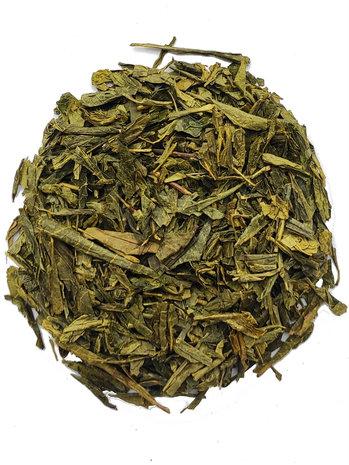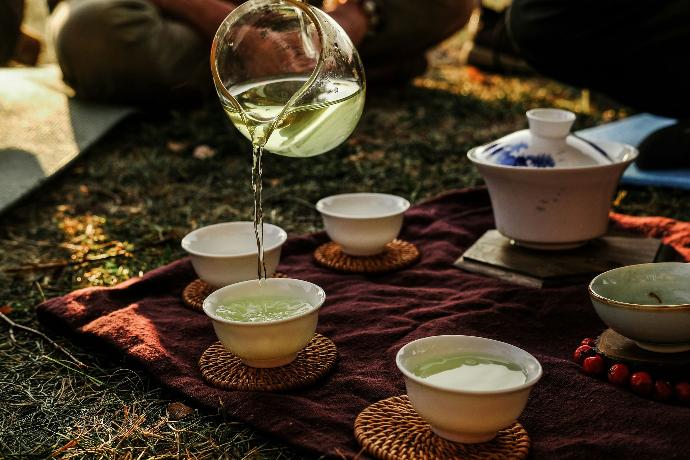As you've probably already noticed, Santy-Shop is a big fan of herbal drinks, especially natural teas. One of these is green tea. As well as giving and explaining the many benefits of green tea, we never forget to give some important recommendations and information, so that you can use it simply and beneficially.
The first details of Thé Vert
Like all natural products, the famous Green Tea Tea has its own health benefits, but it's also important to be aware of its adverse effects beforehand, so as to consume it in moderation. Among the various teas available to us, green tea is undoubtedly the most renowned for its benefits to the body, which is why it is nicknamed "The Star of Teas". Let's take a look at some of the benefits of this tea.

The benefits of Green Tea
- It provides large quantities of antioxidants
- Accompany the weight loss
- Prevents certain cancers
- Preserves cognitive functions
- Soothesanxiety and the stress
- Reduces blood glucose
The history and production of green tea
Green tea derives its main properties from the polyphenols it contains, known as catechins.
These extraordinary active molecules are best preserved in green tea, as the leaves are not oxidized, unlike other forms of tea.
In fact, all varieties are produced by the same tree: Camellia Sinensis, and it is the oxidation (in contact with oxygen) of the tea leaves during the drying process that will define its final color and properties.
Green tea undergoes no oxidation at all, white tea has very little oxidation (12%), Oolong tea, with its blue-green color, undergoes semi-oxidation (up to 70%), and finally, black tea receives complete oxidation.
- There are two traditional methods for stopping leaf oxidation.
- The Japanese method uses gentle steam, which preserves the benefits of the leaves.
- The less delicate Chinese method involves heating the leaves in vats.
What's important to remember is that the more tea is oxidized, the more it tends to lose its antioxidant potential.1
This is why green tea is the star of the healthy tea range.
How to choose the right green tea?
Don't buy just any tea. Drinking green tea is good, but don't skimp on quality. The low-grade tea found in supermarkets is not very appealing, if certain surveys are to be believed. Pesticides, herbicides and heavy metals have been found, even in some organic teas (notably those sold under private labels).
In its study, 60 millions de consommateurs points out that the worst performers in this area are green mint teas, with five of the twelve references tested falling outside the norm. To keep prices down, some manufacturers do not hesitate to blend teas from different origins (Indonesia, China, Kenya...), from large-scale production facilities where profitability takes precedence over quality.
It is therefore very important to choose green tea of impeccable quality. This not only protects you from these pollutants, but also guarantees that all the qualities of the tea have been preserved.
In fact, many green teas are partially oxidized, which is detrimental to their virtues.
Astuce : Green Tea
Look at your tea: If its color is brown rather than green, it has probably been dried in an insensitive way.
Likewise, the leaves should be whole and not crushed to dust, as is often the case with low-grade teas.
Open a bag of green tea from the supermarket and you'll see immediately. The best way to enjoy a good green tea is to take a look at our Santi-Shop page by clicking on the link below.
Tip: use around 2g of tea per 20cl of water, and don't steep in water that's too hot to destroy its precious antioxidants.
The ideal temperature is between 50° and 60° for a maximum brewing time of three minutes.
Precautions to know about Green Tea
- Green tea can be toxic to the liver
- In our view, green tea is best enjoyed as an infusion, and only as an infusion.
- Dietary supplements containing EGCG (green tea's famous catechins) often provide excessively high doses that can be harmful to the liver.
- You should not exceed 300 mg of EGCG per day to avoid any risk.
There's no need to "load up the mule", if you'll pardon the expression.
Supplements have the advantage of concentrating active ingredients, which can be useful in many cases, but when it comes to green tea, the opposite is true. This is all the more regrettable given that, in reasonable doses, green tea has numerous beneficial effects on the liver...
In particular, it helps prevent fatty liver disease (non-alcoholic fatty liver), and is said to have a protective effect against liver cancer.
Between you and me, swallowing a capsule can't compare with enjoying a cup of tea with its unrivalled flavour, can it?
We were talking earlier about a special moment, and that also counts when it comes to doing yourself good!
Beware of green tea if :
- You are prone to stones.
Green tea is rich in calcium oxalates, crystals which are involved in up to 80% of kidney stone formation.
It is therefore recommended not to exceed two cups of tea a day if you are prone to stones. - You are deficient in fer or vegetarian
The tannins in green tea inhibit the absorption of iron, particularly plant-based iron. Vegetarians are therefore the first to be concerned, and should be vigilant on this point. This effect is short-lived, so there's no need to deprive yourself of tea, but take it at least half an hour before meals. - You're expecting a baby
Due to the caffeine in tea, it's advisable to moderate your tea consumption during pregnancy or breastfeeding, especially if you drink coffee. During this period, 300 mg of caffeine a day is the maximum recommended.
To give you a benchmark: a 250 ml cup of coffee contains an average of 180 mg of caffeine, a 50 ml espresso contains 90 mg of caffeine, and a 250 ml cup of green tea contains 30 mg. - You have a fragile stomach and intestines
If your tea is brewed too long or consumed on an empty stomach, you run the risk of stomach problems.
Tannins promote the production of acid in the stomach. This can lead to digestive problems such as nausea and acid reflux. Similarly, too much green tea can cause diarrhoea, due to the laxative effect of caffeine.
So, if you suffer from irritable bowel syndrome, it's best to reduce your intake of green tea. - If you are taking certain medications
Green tea interacts with many medications. Do not abuse it, and ask your doctor for advice if you are taking antidepressants, or if you are undergoing treatment for heart, blood pressure, blood clotting or asthma. - Finally, green tea is not recommended during chemotherapy or radiotherapy, as it can increase the toxicity of certain anti-cancer treatments.
2 to 3 cups of green tea a day is a good balance between pleasure and benefits.
That's a wise thought to apply in many areas!




